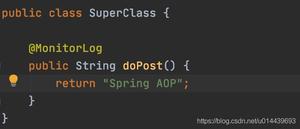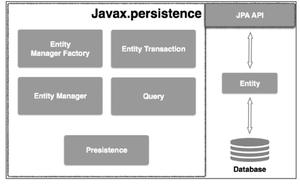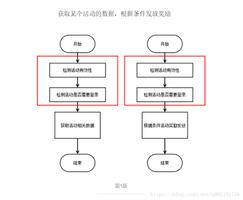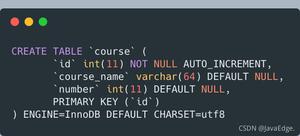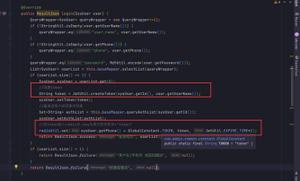Spring AOP(5)-- 注解
本文内容纲要:Spring AOP(5)-- 注解
applicationContext.xml
<context:component-scan base-package="com.atguigu.spring.aop"></context:component-scan>
aop:aspectj-autoproxy</aop:aspectj-autoproxy>
ArithmeticCalculator.java
package com.atguigu.spring.aop;
public interface ArithmeticCalculator {
int add(int i, int j);
int sub(int i, int j);
int mul(int i, int j);
int div(int i, int j);
}
ArithmeticCalculatorImpl.java
package com.atguigu.spring.aop;
import org.springframework.stereotype.Component;
@Component("arithmeticCalculator")
public class ArithmeticCalculatorImpl implements ArithmeticCalculator {
@Override
public int add(int i, int j) {
int result = i + j;
return result;
}
@Override
public int sub(int i, int j) {
int result = i - j;
return result;
}
@Override
public int mul(int i, int j) {
int result = i * j;
return result;
}
@Override
public int div(int i, int j) {
int result = i / j;
return result;
}
}
LoggingAspect.java
package com.atguigu.spring.aop;
import java.util.Arrays;
import org.aspectj.lang.JoinPoint;
import org.aspectj.lang.annotation.After;
import org.aspectj.lang.annotation.AfterReturning;
import org.aspectj.lang.annotation.AfterThrowing;
import org.aspectj.lang.annotation.Aspect;
import org.aspectj.lang.annotation.Before;
import org.aspectj.lang.annotation.Pointcut;
import org.springframework.core.annotation.Order;
import org.springframework.stereotype.Component;
/**
* 可以使用 @Order 注解指定切面的优先级, 值越小优先级越高
*/
@Order(2)
@Aspect
@Component
public class LoggingAspect {
/**
* 定义一个方法, 用于声明切入点表达式. 一般地, 该方法中再不需要添入其他的代码.
* 使用 @Pointcut 来声明切入点表达式.
* 后面的其他通知直接使用方法名来引用当前的切入点表达式.
*/
@Pointcut("execution(public int com.atguigu.spring.aop.ArithmeticCalculator.*(..))")
public void declareJointPointExpression(){}
/**
* 在 com.atguigu.spring.aop.ArithmeticCalculator 接口的每一个实现类的每一个方法开始之前执行一段代码
*/
@Before("declareJointPointExpression()")
public void beforeMethod(JoinPoint joinPoint){
String methodName = joinPoint.getSignature().getName();
Object [] args = joinPoint.getArgs();
System.out.println("The method " + methodName + " begins with " + Arrays.asList(args));
}
/**
* 在方法执行之后执行的代码. 无论该方法是否出现异常
*/
@After("declareJointPointExpression()")
public void afterMethod(JoinPoint joinPoint){
String methodName = joinPoint.getSignature().getName();
System.out.println("The method " + methodName + " ends");
}
/**
* 在方法法正常结束受执行的代码
* 返回通知是可以访问到方法的返回值的!
*/
@AfterReturning(value="declareJointPointExpression()",
returning="result")
public void afterReturning(JoinPoint joinPoint, Object result){
String methodName = joinPoint.getSignature().getName();
System.out.println("The method " + methodName + " ends with " + result);
}
/**
* 在目标方法出现异常时会执行的代码.
* 可以访问到异常对象; 且可以指定在出现特定异常时在执行通知代码
*/
@AfterThrowing(value="declareJointPointExpression()",
throwing="e")
public void afterThrowing(JoinPoint joinPoint, Exception e){
String methodName = joinPoint.getSignature().getName();
System.out.println("The method " + methodName + " occurs excetion:" + e);
}
/**
* 环绕通知需要携带 ProceedingJoinPoint 类型的参数.
* 环绕通知类似于动态代理的全过程: ProceedingJoinPoint 类型的参数可以决定是否执行目标方法.
* 且环绕通知必须有返回值, 返回值即为目标方法的返回值
*/
/*
@Around("execution(public int com.atguigu.spring.aop.ArithmeticCalculator.*(..))")
public Object aroundMethod(ProceedingJoinPoint pjd){
Object result = null;
String methodName = pjd.getSignature().getName();
try {
//前置通知
System.out.println("The method " + methodName + " begins with " + Arrays.asList(pjd.getArgs()));
//执行目标方法
result = pjd.proceed();
//返回通知
System.out.println("The method " + methodName + " ends with " + result);
} catch (Throwable e) {
//异常通知
System.out.println("The method " + methodName + " occurs exception:" + e);
throw new RuntimeException(e);
}
//后置通知
System.out.println("The method " + methodName + " ends");
return result;
}
*/
}
VlidationAspect.java
package com.atguigu.spring.aop;
import java.util.Arrays;
import org.aspectj.lang.JoinPoint;
import org.aspectj.lang.annotation.Aspect;
import org.aspectj.lang.annotation.Before;
import org.springframework.core.annotation.Order;
import org.springframework.stereotype.Component;
@Order(1)
@Aspect
@Component
public class VlidationAspect {
@Before("com.atguigu.spring.aop.LoggingAspect.declareJointPointExpression()")
public void validateArgs(JoinPoint joinPoint){
System.out.println("-->validate:" + Arrays.asList(joinPoint.getArgs()));
}
}
Main.java
package com.atguigu.spring.aop;
import org.springframework.context.ApplicationContext;
import org.springframework.context.support.ClassPathXmlApplicationContext;
public class Main {
public static void main(String[] args) {
ApplicationContext ctx = new ClassPathXmlApplicationContext("applicationContext.xml");
ArithmeticCalculator arithmeticCalculator = (ArithmeticCalculator) ctx.getBean("arithmeticCalculator");
System.out.println(arithmeticCalculator.getClass().getName());
int result = arithmeticCalculator.add(1, 2);
System.out.println("result:" + result);
result = arithmeticCalculator.div(1000, 10);
System.out.println("result:" + result);
}
}
本文内容总结:Spring AOP(5)-- 注解
原文链接:https://www.cnblogs.com/yang-hao/p/5821822.html
以上是 Spring AOP(5)-- 注解 的全部内容, 来源链接: utcz.com/z/296942.html


